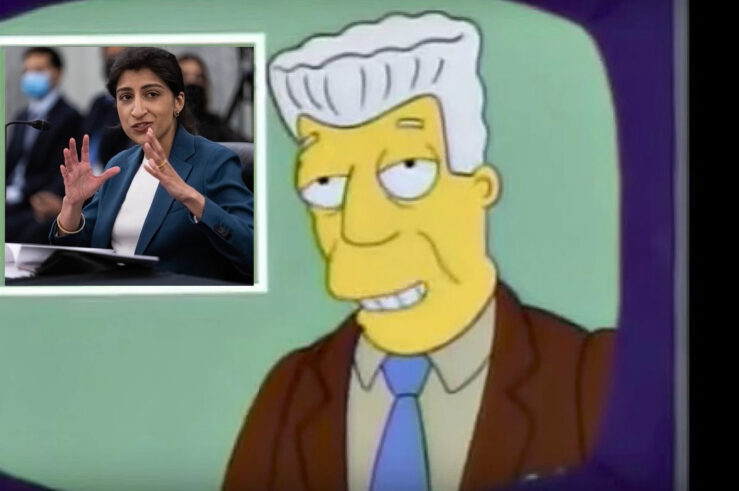Showing archive for: “Consumer Protection”
Where Are the New FTC Rules?
Perhaps more than at any time in its history, the Federal Trade Commission (FTC) under Chair Lina Khan has highlighted substantive rulemaking as a central element of its policy agenda. But despite a great deal of rule-related sound and fury (signifying nothing?), new final rules have yet to emerge, and do not appear imminent. This ... Where Are the New FTC Rules?
Google, Amazon, Switching Costs, and Red Herrings
Way back in May, I cracked wise about the Federal Trade Commission’s (FTC) fictional “Bureau of Let’s Sue Meta,” noting that the commission’s proposal (really, an “order to show cause”) to modify its 2020 settlement of a consumer-protection matter with what had then been Facebook—in other words, a settlement modifying a 2012 settlement—was the FTC’s ... Google, Amazon, Switching Costs, and Red Herrings
I, For One, Welcome Our New FTC Overlords
In this post—the last planned post for this symposium on The FTC’s New Normal (though we will continue to accept unsolicited submissions of responses)—I will offer some summary of the ideas that have been shared here over the past month, before turning to some of my own thoughts. To keep your attention rapt, I will ... I, For One, Welcome Our New FTC Overlords
More FTC Overreach in Labor Markets
The Federal Trade Commission (FTC) and U.S. Labor Department (DOL) signed a memorandum of understanding (MOU) this past week “to strengthen the Agencies’ partnership through greater cooperation and coordination in information sharing, investigations and enforcement activity, training, education, research, and outreach.” The accompanying Sept. 21 announcement is another example of FTC overreach, as it highlights ... More FTC Overreach in Labor Markets
Note to the FTC: Punishing Efficiency Means Destroying Competition
Yesterday, Lina Khan’s FTC released their long-awaited draft merger guidelines for public comment. Regrettably yet not unsurprisingly, the new guidelines are a radical departure from established case law and antitrust thinking. They’re marked by a failure to account for the role of efficiencies in the competitive process, and a failure to distinguish between the implications of generally ... Note to the FTC: Punishing Efficiency Means Destroying Competition
FTC Returns to Section 18 Rulemaking with Impersonation Fraud Hearing
The Federal Trade Commission (FTC) last week held its first informal hearing in 20 years on Section 18 rulemaking. The hearing itself had a technical delay, which to us participants felt like another 20 years, but was a mere two hours or so. At issue is a proposed rule intended to target impersonation fraud. Impersonation fraudsters hold themselves out ... FTC Returns to Section 18 Rulemaking with Impersonation Fraud Hearing
Biweekly FTC Roundup: Bureau of Let’s-Sue-Meta Edition
The Federal Trade Commission (FTC) might soon be charging rent to Meta Inc. The commission earlier this week issued (bear with me) an “Order to Show Cause why the Commission should not modify its Decision and Order, In the Matter of Facebook, Inc., Docket No. C-4365 (July 27, 2012), as modified by Order Modifying Prior Decision and Order, In ... Biweekly FTC Roundup: Bureau of Let’s-Sue-Meta Edition
Four Horsemen of the Bureaucratic Apocalypse Come for AI
Four prominent horsemen of the Biden administration’s bureaucratic apocalypse—the Federal Trade Commission (FTC), U.S. Justice Department (DOJ) Civil Rights Division (DOJ), Consumer Financial Protection Bureau (CFPB), and the U.S. Equal Employment Opportunity Commission (EEOC)—came together April 25 to issue a joint statement pledging vigorous enforcement against illegal activity perpetrated through the use of artificial intelligence ... Four Horsemen of the Bureaucratic Apocalypse Come for AI
Biweekly FTC Roundup: But Wait, There’s More Edition
More, and not just about noncompetes, but first, yes (mea culpa/s’lach lanu), more about noncompetes. Yesterday on Truth on the Market, I provided an overview of comments filed by the International Center for Law & Economics on the Federal Trade Commission’s (FTC) proposed noncompete rule. In addition to ICLE’s Geoffrey Manne, Dirk Auer, Brian Albrecht, Gus Hurwitz, and ... Biweekly FTC Roundup: But Wait, There’s More Edition
Why Competition Enforcers’ Annual Roundtable Should Focus on Competition Advocacy and Combating Anticompetitive Market Distortions
Spring is here, and hope springs eternal in the human breast that competition enforcers will focus on welfare-enhancing initiatives, rather than on welfare-reducing interventionism that fails the consumer welfare standard. Fortuitously, on March 27, the Federal Trade Commission (FTC) and U.S. Justice Department (DOJ) are hosting an international antitrust-enforcement summit, featuring senior state and foreign ... Why Competition Enforcers’ Annual Roundtable Should Focus on Competition Advocacy and Combating Anticompetitive Market Distortions
Is the FTC Threatening Efficient Franchise Relationships?
Franchising plays a key role in promoting American job creation and economic growth. As explained in Forbes (hyperlinks omitted): Franchising as a business institution is oriented toward reducing economic inefficiencies in commercial relationships. Specifically, economic analysis reveals that it is a potential means for dealing with opportunism and cabining transaction costs in vertical-distribution contracts. In ... Is the FTC Threatening Efficient Franchise Relationships?
No, Mergers Are Not Like ‘The Ultimate Cartel’
There is a line of thinking according to which, without merger-control rules, antitrust law is “incomplete.”[1] Without such a regime, the argument goes, whenever a group of companies faces with the risk of being penalized for cartelizing, they could instead merge and thus “raise prices without any legal consequences.”[2] A few months ago, at a ... No, Mergers Are Not Like ‘The Ultimate Cartel’












